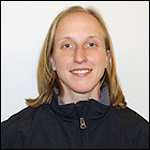New Women’s Hockey Coach Jodi McKenna Uses Sound Fundamentals as Ice Breaker
| Posted 09/19/07 |
 Q: Jodi, you spent nine seasons as an assistant coach at St. Lawrence University. What attracted you to Wesleyan? Q: Jodi, you spent nine seasons as an assistant coach at St. Lawrence University. What attracted you to Wesleyan?
A: I enjoyed my nine years at St. Lawrence and would have been content to begin a 10th, however, the opportunity to coach at Wesleyan was one that I could no turn down, for two main reasons. Professionally, I am very excited to be at an institution of Wesleyans caliber and to be able to work with the dynamic student-athletes the university attracts. I am a Rhode Island native. Its nice to be back in New England. Q: When does hockey season begin, and how does the team prepare? A: Hockey practice begins Nov. 1, a date that I have circled on the calendar. The team trains in the pre-season by lifting weights and through interval and agility training. The ice is put down in the arena in the first week in October and the players will be able to begin on-ice training then. Our first opponent is Trinity on Nov. 16. Q: Have you met your team members? A: I have had the opportunity to meet the team as a group and individually. They are a very motivated and hard working group, which is a great foundation on which to build. I have seen video of last years games and am excited by the combination of upperclassmen returnees and incoming first years that make up the roster. Q: What are your goals for your first year? A: We have many small goals for the first year that will hopefully lead to an improved win/loss record and a spot in the NESCAC playoffs. Initially, I would like to build a team known for strong defensive play, sound fundamentals and a tremendous work ethic. Q: When and where did you being skating, and when did you begin playing hockey? A: I began figure skating when I was 4, but idolized my brother who was a hockey player. After one year of skating I was able to convince my parents, mainly my mother, to let me play hockey. I think she only agreed because she thought it would be a passing phase. Little did she know that I would make it a career. Q: Where did you attend college and what was your hockey career like there? A: I went to Brown University and graduated with a degree in American history. During my time there I had the good fortune to play on successful teams, winning the Ivy League title, the ECAC playoffs and placing second in the first-ever womens national championship. As a benefit to my coaching career I had the opportunity to play both defense and forward. Overall, it was a great experience. Q: In addition to coaching hockey, you are a certified strength and conditioning coach. How will this benefit your team? A: Being a strength and conditioning coach has been a tremendous benefit to coaching hockey. Hockey is such a physical and dynamic sport and one that challenges the body in so many ways at any given moment on the ice. A strength and conditioning program can help prevent and lessen injuries common to hockey. My hope for the players is that by dedicating themselves to a program they can stay healthy through the entire season. Q: What are your thoughts on the Spurrier-Snyder Rink and the Freeman Athletic Center? A: I am very impressed by the athletic facilities here at Wes. The combination of the stat-of-the-art Freeman Center and the old-school feel of the Spurrier-Snyder Rink are unique to many of the schools around the league. The closeness of all the facilities means that there is a lot of interaction with and support from athletes and coaches of all the sports. Q: Have you had the opportunity to meet the other Wesleyan coaches? A: Yes. The coaches here are absolutely fantastic. Their experience and dedication to the student-athletes forms the foundation of the athletic department. I hope to use them as a resource to learn more about Wesleyan and coaching in general. Q: You have past experience coaching USA Hockey with the 18-19 Junior Olympic Festival and the 15-16 Festival. Are there other programs you are, or have been involved with? A: I have had the opportunity to work with USA Hockey on a regional level and with private hockey camps throughout the country. Although hockey is smaller than most sports, it is growing in non-traditional areas such as the southeast and southwest. Its nice to see that growth and experience it first-hand. Q: Aside from hockey, what activities do you enjoy? A: I enjoy anything that involves competition, through participation or watching sports on television. In my spare time, I try to squeeze in workouts, reading — mainly history — and walking my dog, a chocolate lab named Banshee. |
| By Olivia Drake, The Wesleyan Connection editor |

